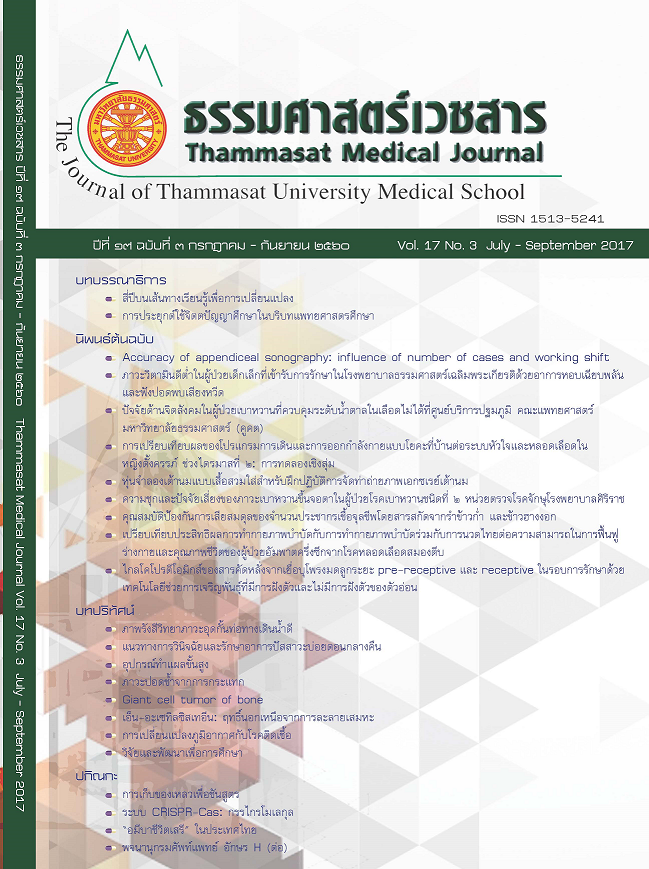N-acetylcysteine: beyond mucolytic action
Keywords:
N-acetylcysteine, Mucolytic agent, Anti-inflammatory, Antioxidant, เอ็น-อะเซทิลซิสเทอีน, ยาละลายเสมหะ, ฤทธิ์ต้านการอักเสบ, ฤทธิ์ต้านสารอนุมูลอิสระAbstract
N-acetylcysteine (NAC) has long been approved for therapeutically using as mucolytic agent and also for the treatment of paracetamol overdose. Beyond mucolytic action, N-acetylcysteine also possesses an antiinflammatory action and also showed a powerful antioxidant action. N-acetylcysteine exhibits anti-inflammatory properties demonstrated by various studies. It was reported that N-acetylcysteine decreased the production of tumor necrosis factor alpha (TNFα), interleukin-1beta (IL-1β) and interleukin-6 (IL-6) and also inhibited the activity of inducible nitric oxide synthase (iNOS) and nuclear factor kappa B (NF- B) as well. N-acetylcysteine possesses the antioxidant property by raising the intra-cellular concentration of cysteine, therefore increasing the production of reduced glutathione (GSH) and acts by scavenging of oxidant species. Due to the anti-inflammatory and antioxidant action, N-acetylcysteine was used as adjunct therapy for various condition i.e. contrast-induced nephropathy (CIN), prevention of cisplatin-induced ototoxicity and a variety of neuropsychiatric conditions.
เอ็น-อะเซทิลซิสเทอีน: ฤทธิ์นอกเหนือจากการละลายเสมหะ
เอ็น-อะเซทิลซิสเทอีนเป็นยาที่ได้รับอนุมัติทะเบียนเพื่อใช้เป็นยาละลายเสมหะและเพื่อใช้เป็นยาต้านพิษที่เกิดจากยาพาราเซตามอลเกินขนาด นอกจากฤทธิ์การละลายเสมหะแล้ว ยานี้ยังมีฤทธิ์ต้านการอักเสบและฤทธิ์ต้านสารอนุมูลอิสระด้วย โดยยานี้สามารถยับยั้งการสร้างสารสื่อกลางการอักเสบได้หลายตัว ได้แก่ tumor necrosis factor alpha (TNFα), interleukin-1beta
(IL-1β) และ interleukin-6 (IL-6) รวมทั้งยับยั้งการท????ำงานของเอนไซม์ inducible nitric oxide synthase (iNOS) และยับยั้งการสร้างสาร nuclear factor kappa B (NF - B) ด้วยเช่นกัน ฤทธิ์ต้านอนุมูลอิสระของยานี้ เกิดจากการให้สารตั้งต้นซีสเทอีนแก่เซลล์ เพื่อใช้ในการสร้างสารต้านอนุมูลอิสระกลูตาไธโอน โดยกลูตาไธโอนจะออกฤทธิ์ต้านภาวะออกซิเดทีฟสเตรทต่อไป เนื่องจากพื้นฐานการออกฤทธิ์ที่เกี่ยวข้องกับการต้านการอักเสบและการต้านอนุมูลอิสระ ท????ำให้ปัจจุบันยังมีการวิจัยเกี่ยวกับประโยชน์ทางการแพทย์ของยาเอ็น-อะเซทิสซิสเทอีนในด้านอื่นๆ ด้วย เช่น ป้องกันภาวะไตอักเสบจากสารทึบรังสี ป้องกันภาวะพิษในการท????ำลายประสาทหูจากยามะเร็งซีสพลาติน รวมทั้งช่วยในการรักษาโรคความผิดปรกติทางสมองต่างๆ เป็นต้น


